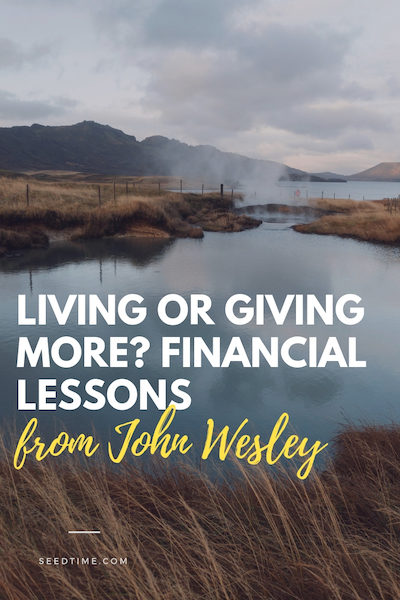
John Wesley (June 28, 1703 – March 2, 1791) was a Church of England cleric and Christian theologian who taught – and lived out – some financial principles which continue to challenge us today.
Wesley’s principles for money can be summarized with these three thoughts:
Gain all you can.
Perhaps because he grew up in poverty, witnessing his father (an Anglican priest in one of England’s lowest-paying parishes) being marched off to debtor’s prison, John accepted a more lucrative position: teacher at Oxford University. John’s salary increased dramatically, from 30 pounds annually (enough for a single man to live well on) to 60 pounds, then 90 pounds, then 120 pounds and eventually to over a thousand pounds. Rather than believing, as some did, that money was inherently evil, Wesley thought of all the good one could do with money . . . more money meant more good. John Wesley knew how to earn money, and he did so quite well.
Save all you can.
Saving, to Wesley, meant not spending. Being a single man most of his life, he stored very little of his earnings for the types of savings we deem non-negotiables today, such as emergency funds or retirement nest eggs. He urged his followers to purchase only the absolute basic necessities of life, rightly noting that purchases of expensive food, fancy clothing and elegant furniture was wasteful. But he also pointed out that when people spend money on things they do not really need, they begin to want more things they do not need, stating, “Who would depend anything in gratifying these desires, if he considered that to gratify them is to increase them? Nothing can be more certain than this: Daily experience shows that the more they are indulged, they increase the more.”
Because people who would never waste money on themselves might be more indulgent with their children. Wesley especially warned against buying too much for children. Based on the principle that gratifying a desire needlessly only tends to increase it, he asked these well-intentioned parents: “Why should you purchase for them more pride or lust, more vanity or foolish and hurtful desires? . . . Why should you be at further expense to increase their temptations and snares and to pierce them through with more sorrows?”
Give all you can.
An event which occurred while Wesley was at Oxford greatly impacted his views on giving. Evidently, after purchasing some pictures for his room, he noticed one cold winter day that one of the chambermaids had nothing to protect her except a thin linen gown. When he reached into his pocket to give her some money to buy a coat, he found he had too little left. Immediately, the thought struck him that the Lord was not pleased with the way he had spent his money. He asked himself, “Will thy Master say, ‘Well done, good and faithful steward?’ Thou hast adorned thy walls with the money which might have screened this poor creature from the cold! O justice! O mercy! Are not these pictures the blood of this poor maid?”
From that day, in 1731, Wesley determined to maintain his standard of living at the same level and give away everything above that threshold. At that time, with earnings of 30 pounds and living expenses at 28 pounds, he gave away two pounds. When his earnings increased to 60 pounds, he gave away 32. As they increased to 120 pounds, he continued to live on 28 and give away 92 pounds.
Wesley became known for his saying, “What should rise is not the Christian’s standard of living, but his standard of giving.”
He continued this practice his entire life. Even when his income reached 1400 pounds, he lived on 30 pounds and gave the rest away. Wesley was afraid of laying up treasures on earth, so the money went out in charity as quickly as it came in. He reports that he never had more than 100 pounds at any one time.
How about today?
You may be thinking, “Joe, I certainly admire John Wesley for his principles and his commitment to living out those principles. But surely we can’t be expected to live up to those same guidelines in today’s world.”
I am not saying you should . . . those decisions are between you and your spouse and God. But I can say that my wife and I are challenged by these principles. We are not going to forgo our emergency savings or our retirement savings, but we are seriously considering ways to maintain our standard of living in order to increase our standard of giving.
That principle is timeless and, in my thinking, is one we should all be thinking about.
A financial prayer
I will close with this prayer from Wesley. He was confident that any believer who has a clear conscience after praying this prayer will be using money wisely.
“Lord, thou seest I am going to expend this sum on that food, apparel, furniture. And thou knowest I act therein with a single eye, as a steward of thy goods, expending this portion of them thus, in pursuance of the design thou hadst in entrusting me with them. Thou knowest I do this in obedience to thy word, as thou commandest, and because thou commandest it. Let this, I beseech thee, be a holy sacrifice, acceptable through Jesus Christ! And give me a witness in myself, that for this labor of love I shall have a recompence when thou rewardest every man according to his words.”
Readers: which of Wesley’s principles do you agree with? Where do you differ? Which ones challenge you to change how you currently handle money?




